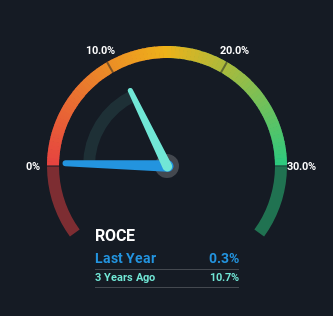Returns On Capital Signal Difficult Times Ahead For UNITEDLABELS (ETR:ULC)
What financial metrics can indicate to us that a company is maturing or even in decline? More often than not, we'll see a declining return on capital employed (ROCE) and a declining amount of capital employed. This combination can tell you that not only is the company investing less, it's earning less on what it does invest. In light of that, from a first glance at UNITEDLABELS (ETR:ULC), we've spotted some signs that it could be struggling, so let's investigate.
Return On Capital Employed (ROCE): What Is It?
If you haven't worked with ROCE before, it measures the 'return' (pre-tax profit) a company generates from capital employed in its business. To calculate this metric for UNITEDLABELS, this is the formula:
Return on Capital Employed = Earnings Before Interest and Tax (EBIT) ÷ (Total Assets - Current Liabilities)
0.0026 = €28k ÷ (€22m - €11m) (Based on the trailing twelve months to September 2022).
Therefore, UNITEDLABELS has an ROCE of 0.3%. Ultimately, that's a low return and it under-performs the Leisure industry average of 17%.
View our latest analysis for UNITEDLABELS

Historical performance is a great place to start when researching a stock so above you can see the gauge for UNITEDLABELS' ROCE against it's prior returns. If you want to delve into the historical earnings, revenue and cash flow of UNITEDLABELS, check out these free graphs here.
How Are Returns Trending?
In terms of UNITEDLABELS' historical ROCE movements, the trend doesn't inspire confidence. About five years ago, returns on capital were 7.3%, however they're now substantially lower than that as we saw above. On top of that, it's worth noting that the amount of capital employed within the business has remained relatively steady. Since returns are falling and the business has the same amount of assets employed, this can suggest it's a mature business that hasn't had much growth in the last five years. So because these trends aren't typically conducive to creating a multi-bagger, we wouldn't hold our breath on UNITEDLABELS becoming one if things continue as they have.
On a side note, UNITEDLABELS has done well to pay down its current liabilities to 49% of total assets. So we could link some of this to the decrease in ROCE. Effectively this means their suppliers or short-term creditors are funding less of the business, which reduces some elements of risk. Some would claim this reduces the business' efficiency at generating ROCE since it is now funding more of the operations with its own money. Either way, they're still at a pretty high level, so we'd like to see them fall further if possible.
The Bottom Line
All in all, the lower returns from the same amount of capital employed aren't exactly signs of a compounding machine. Despite the concerning underlying trends, the stock has actually gained 10% over the last five years, so it might be that the investors are expecting the trends to reverse. Regardless, we don't like the trends as they are and if they persist, we think you might find better investments elsewhere.
If you want to continue researching UNITEDLABELS, you might be interested to know about the 2 warning signs that our analysis has discovered.
While UNITEDLABELS isn't earning the highest return, check out this free list of companies that are earning high returns on equity with solid balance sheets.
New: AI Stock Screener & Alerts
Our new AI Stock Screener scans the market every day to uncover opportunities.
• Dividend Powerhouses (3%+ Yield)
• Undervalued Small Caps with Insider Buying
• High growth Tech and AI Companies
Or build your own from over 50 metrics.
Have feedback on this article? Concerned about the content? Get in touch with us directly. Alternatively, email editorial-team (at) simplywallst.com.
This article by Simply Wall St is general in nature. We provide commentary based on historical data and analyst forecasts only using an unbiased methodology and our articles are not intended to be financial advice. It does not constitute a recommendation to buy or sell any stock, and does not take account of your objectives, or your financial situation. We aim to bring you long-term focused analysis driven by fundamental data. Note that our analysis may not factor in the latest price-sensitive company announcements or qualitative material. Simply Wall St has no position in any stocks mentioned.
About XTRA:ULC
UNITEDLABELS
Provides branded products for media and entertainment industry in Germany and internationally.
Reasonable growth potential and fair value.
Market Insights
Community Narratives



